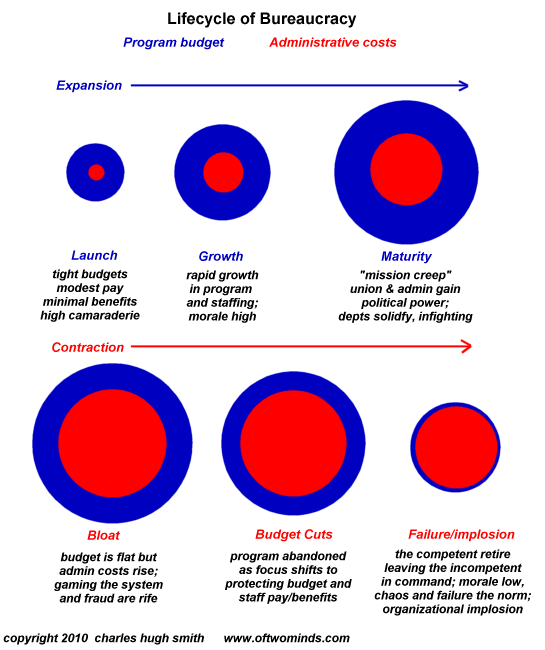So the Deep State is good, but the Total Surveillance State is even better.
The Deep State and The Total Surveillance State are viewed unfavorably for self-evident reasons: the unelected Deep State is anathema to democracy and the Total Surveillance State (and its oh-so-profitable handmaiden, Surveillance Capitalism) are anathema to democracy, freedom and personal liberty.
Let’s play devil’s advocate and consider the positives of the Deep State and the Total Surveillance State. As devil’s advocates we must set aside our negative emotions and assessments, and conjure up a case for favoring the Deep State and the Total Surveillance State.
A recent attempt to cast a favorable light on the Deep State breezily conflates public/civil service with the Deep State, a purposeful misdirection of the definition of the Deep State: the Deep State is not the sum total of public/civil servants or federal employees; it is the unelected governmental structure that makes decisions on behalf of the nation’s citizenry without their knowledge, input or approval.
It Turns Out the ‘Deep State’ Is Actually Kind of Awesome (NYT.com)
The Deep State’s job is to keep the Imperial Project humming along regardless of whomever has been elected to the Presidency or Congress. The protocols of the Republic require some appearance of oversight by the elected branches of the state over the unelected branches of the state, but elected officials aren’t about to shut down the Imperial Project–the maintenance and expansion of all forms of cultural, economic, financial, diplomatic and military power, a.k.a. soft and hard power. Oversight boils down to “don’t do anything which embarrasses us optically.”
The positive potential of the Deep State lies in the asymmetry of competence and functionality between the elected and unelected branches of the state. If the elected state devolves into a circus of incompetence, PR charades, self-aggrandizement and dysfunction, then having a competent, well-managed Deep State is a very good thing, as the incompetent, dysfunctional elected state can provide entertainment value without doing irreparable damage to the nation.
The problem, of course, is that since we never really know what the Deep State is up to, it’s impossible to tell if it is operationally competent or not. But since we know the political circus is dysfunctional and corrupt, the possibility that the Deep State is still competent and less compromised by corruption is cheering.
A recent video posted by an American visiting China made a splash by summarizing the positive changes that have transformed China in the past five years.
The 7 major ways China has changed between 2019 and 2024. The seven positive systemic changes: 1) widespread automation of services and transactions, 2) rise of EVs (electric vehicles); 3) cleaner air; 4) public behavior is “more civilized” (given China’s role as a wellspring of civilization, I would rephrase this as “more courteous”); 5) fewer foreigners; 6) manufacturers are selling directly to consumers, and 7) everything is more harmonious and better.
While extolling the advance of public courtesy, comparing it favorably to famously polite and well-ordered Japan, Mr. Hart mentions public campaigns promoting civil behaviors and the role of automation in reducing the opportunities for ripping off consumers.
He did not mention the primary driver of improved public behavior, China’s transformation into a Total Surveillance State, the happy marriage of Surveillance Capitalism and the Surveillance State, in which millions of cameras record and identify citizens’ behaviors, and those who break the rules find their ability to buy a train or airline ticket has been rescinded, or they get a friendly invitation from the local police to “come by for tea” to receive a suggestion to clean up one’s act lest life becomes much less pleasant and much more difficult.
Where rudely cutting in line once generated no real consequence, now it does. So cutting in line now offers a very poor risk-return ratio: the gain is minimal compared to the potential costs / consequences. Given humans’ keen alertness to windfalls, gains and losses, cutting in line is no longer a common transgression.
It is thus unsurprising that the public broadly approves of the Surveillance State’s social credit system penalizing anti-social behavior. Bad behavior diminishing benefits everyone, and it provides employment to all those public servants staffing local police stations, monitoring video, screening social media, and so on. What’s not to like?
The tricky part, of course, is who gets to define anti-social behavior? Those in charge of the Total Surveillance State tend to view criticism of their efforts as undeserved ingratitude, and so criticism of the Surveillance State becomes a form of anti-social behavior that must be stamped out.
Other potential threats to those in charge slide easily into the programming of automation and surveillance, and so dissatisfaction is no longer expressed in action (protests, etc.) but inaction: people drop out of being productively employed, marrying and having children.
There are many reasons for the collapse of marriage and birth rates in East Asia and elsewhere, but courteous public behavior, automation, EVs, cleaner skies, factory-to-consumer supply chains and a well-ordered society don’t seem to have the power to reverse this mass opting out.
So the Deep State is good, but the Total Surveillance State is even better. Everyone obeys the rules, society becomes harmonious, and for reasons that escape those in charge, people give up on work, marriage and having children. Other than that, it’s all blue skies for Deep States and Total Surveillance States.

Deep States and Total Surveillance States share one consequential structural characteristic:

New podcast:
Tommy Carrigan and I discuss the Fourth Turning
New podcast: Self Reliance & The Importance of Choice (24 min), Part 2 in a three-part exploration of self-reliance.
My recent books:
Disclosure: As an Amazon Associate I earn from qualifying purchases originated via links to Amazon products on this site.
Self-Reliance in the 21st Century print $18,
(Kindle $8.95,
audiobook $13.08 (96 pages, 2022)
Read the first chapter for free (PDF)
The Asian Heroine Who Seduced Me
(Novel) print $10.95,
Kindle $6.95
Read an excerpt for free (PDF)
When You Can’t Go On: Burnout, Reckoning and Renewal
$18 print, $8.95 Kindle ebook;
audiobook
Read the first section for free (PDF)
Global Crisis, National Renewal: A (Revolutionary) Grand Strategy for the United States
(Kindle $9.95, print $24, audiobook)
Read Chapter One for free (PDF).
A Hacker’s Teleology: Sharing the Wealth of Our Shrinking Planet
(Kindle $8.95, print $20,
audiobook $17.46)
Read the first section for free (PDF).
Will You Be Richer or Poorer?: Profit, Power, and AI in a Traumatized World
(Kindle $5, print $10, audiobook)
Read the first section for free (PDF).
The Adventures of the Consulting Philosopher: The Disappearance of Drake (Novel)
$4.95 Kindle, $10.95 print);
read the first chapters
for free (PDF)
Money and Work Unchained $6.95 Kindle, $15 print)
Read the first section for free
Become
a $3/month patron of my work via patreon.com.
Subscribe to my Substack for free
NOTE: Contributions/subscriptions are acknowledged in the order received. Your name and email
remain confidential and will not be given to any other individual, company or agency.
| Thank you, Steve K. ($5/month), for your magnificantly generous subscription to this site — I am greatly honored by your support and readership. |
Thank you, Kevin W. ($50), for your marvelously generous subscription to this site — I am greatly honored by your support and readership. |
| Thank you, Julius L. ($50), for your splendidly generous subscription to this site — I am greatly honored by your steadfast support and readership. |
Thank you, Daniel L. ($50), for your superbly generous subscription to this site — I am greatly honored by your steadfast support and readership. |
